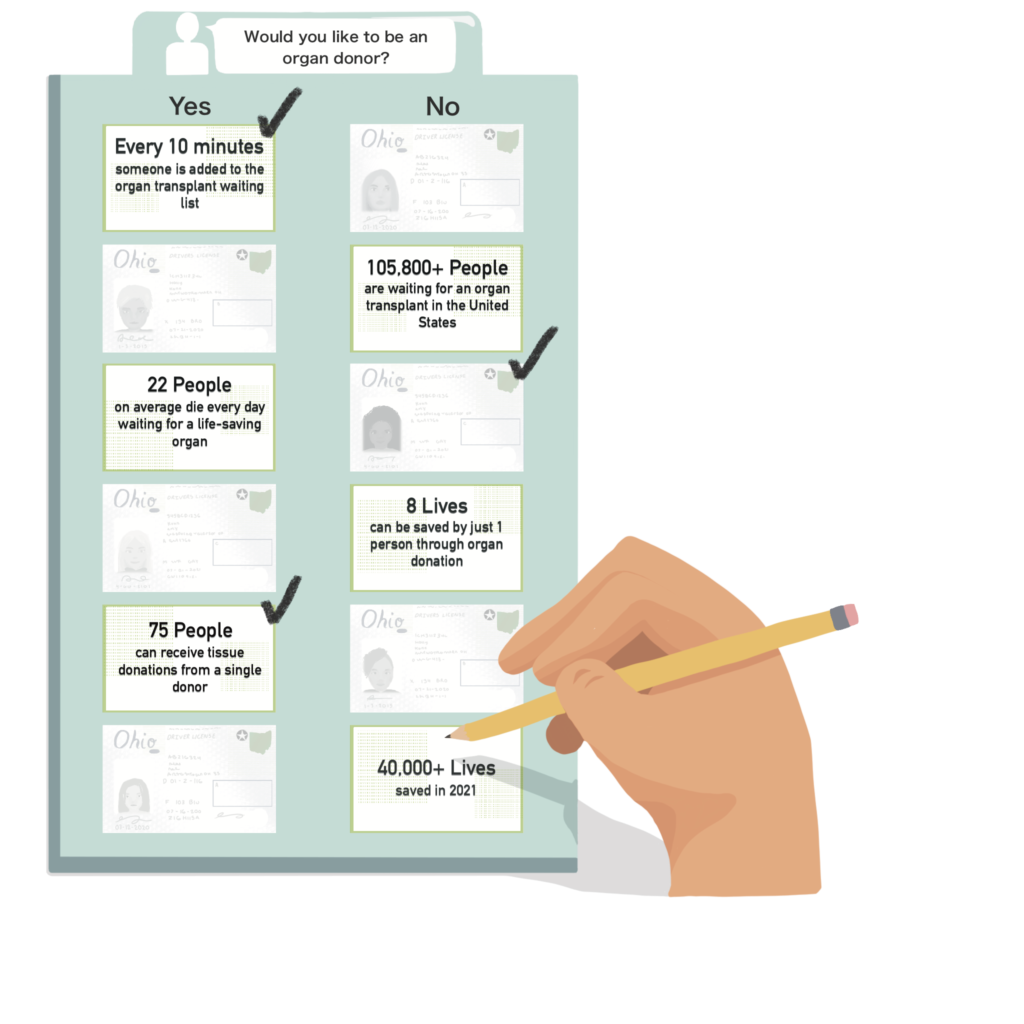Transplant brings new perspective on organ donation

Aimee Liu | The Chronicle
Organ donation is not just a checkbox at the Bureau of Motor Vehicles (BMV).
Organ donation is the process of surgically removing a healthy organ from a donor for transplantation to another person. Donors can be alive or deceased and can donate internal organs such as hearts, livers, kidneys, lungs, and more.
The process of matching a recipient with a donor usually takes several years depending on the specific situation of both parties. The matching process includes taking measurements of blood types and antibodies, as well as being placed on waiting lists and carefully evaluating candidates.
In July 2019, Junior Nadia Khan was diagnosed with microscopic polyangiitis (MPA), an autoimmune disease that attacked her kidneys. As a result, Khan had to undergo dialysis to remove waste products and excess fluid from her blood, essentially serving as a substitute for the normal function of a kidney.
“I got really sick; I’d get out of breath, I was really fatigued, and [did] not eat as much,” Khan said. “Before that, I had no health problems.”
As a 13-year-old, Khan was unable to partake in typical teenage activities. For the 19 months that she was on dialysis, Khan said she continued with online school, but could not go out often due to her weakened immune system.
“There [are] a lot of limitations to life when you have organ problems,” Khan said. “You don’t feel too good, and [there are] lots of medications, risks and treatments. You can’t live your life to the fullest.”
After receiving her kidney transplant on May 4, 2021, Khan said that she felt like the color in her face came back, and that she could do more everyday tasks without needing a nap in the middle of the day.
However, while the transplant solved many issues, Khan said she still faces a slew of health risks. Some of these include taking and managing multiple medications, having a catheter in her stomach and practicing caution when exercising and taking showers.
“It wasn’t [an] easy recovery, but I like to think that it only goes up from here,” Khan said. “It’s not like I’m stuck on dialysis, I just have to get through [the recovery].”
With an increased risk for many illnesses, Khan said that facing the lingering consequences of her disease and transplant can be frustrating. After missing a significant amount of school due to being sick, Khan said that her experience has definitely affected her mental health.
“I stay on top of my work, but it’s really demotivating when you feel trapped in your body during dialysis, and then you still feel trapped [after surgery] because you just can’t stop getting sick no matter what you do,” Khan said.
One of the positives for Khan, however, is the amount of knowledge she has gained and the insight that being sick has given her for the future. Khan said that when she first got sick, she had trouble processing the information, but eventually developed a more optimistic view of her situation.
“I’ve learned a lot of things about the body from this,” Khan said. “I want to become a pediatric nephrologist. I’ve always wanted to do medical things, but [now] I’m set on wanting to do this.”
Khan said that because much of her perspective and mental health has been rooted in her illness, it has been difficult to bond with others her age.
“I can’t necessarily relate to many people,” Khan said. “I always wonder what it’s like to be a normal kid. I don’t think I’ve had a single day since I got sick where I woke up and didn’t think about my health.”
Given the importance of organ donation to her well-being, Khan said that the stigma surrounding it should be erased. While there are valid reasons to choose not to be an organ donor, Khan said she encourages people to look into their beliefs, discuss the topic with family, and consider how it could change someone else’s life.
“I think the idea of removing all your organs from your body kind of freaks people out,” Khan said. “Maybe it’s a religious thing for people to want to be buried with their body intact, but I know that being an organ donor is not a bad thing at all, and it’s nothing to be scared about.”
People are given the option to become an organ donor when they receive their driver’s license. If they choose to register, they are then added to a registered donor list. Khan said that although driver’s education courses and the Bureau of Motor Vehicles do not often place emphasis on the significance of organ donation, it is important to look into before taking your driver’s license test.
“When I got my license, it was just a yes or no button,” Khan said. “My driver’s [education] said [organ donation] was all about dying and ripping out your organs, [but] organ donations are very important [because] you can change somebody’s life.”
Khan said that despite the fears associated with death, organ donation is ultimately a way to create a positive impact.
“I think people get scared by the term ‘organ donor,’ but it means that your organs could go to someone in need,” Khan said. “I think it’s a really beautiful thing how people have discovered how to take someone’s organs [to] save someone else’s life.”
After her experience with MPA, Khan said that her perspective on life has changed greatly. She said that after what she has been through, it is much easier to appreciate the small things around her.
“I’m definitely a lot more appreciative of things that life has to offer, like coming to school and being able to see my friends,” Khan said. “Knowing what it’s like on the inside of a hospital, you just really are very grateful for health and being able to live as a normal teenager.”
